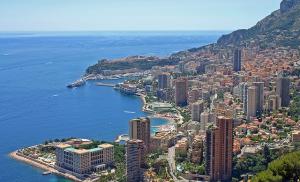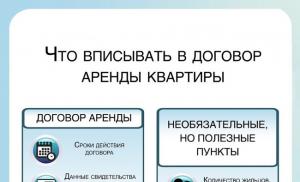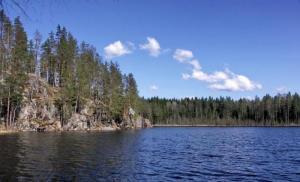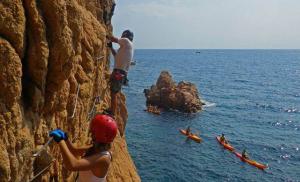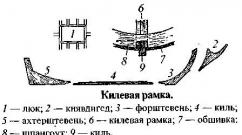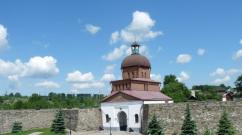Description of the districts of Munich. Where to stay in Munich: overview of areas and hotels Best options for accommodation
Munich is the capital of Bavaria, the third largest and first most visited city in Germany. The population of this city is more than 1.5 million people, and during the famous Oktoberfest festival it increases significantly. Munich is famous for its Bavarian traditions, breweries and football matches. To visit this German city, you must first book accommodation in a specific area. Let's look at in our article which areas of Munich are suitable for tourists.
Historical parts of the city
The main attractions of the capital of Bavaria are located in the central area of the city. Of course, housing in this area will be expensive, especially during the tourist season, which lasts from May to October. If you are on a budget, it is better to stay in hotels located around the central railway station. You need to decide which priority is more important - to be in the very center of the city, or closer to the station, from where you can move around the region.
The area in the center of Munich is called Altstadt-Lehel ), or the old city. It is quite large, so it is divided in turn into 2 parts:
- Altstadt;
- Lehel.
The old town is more expensive, but at the same time convenient for living. Fans of shopping will find something for themselves interesting shops, and lovers of sightseeing will not be disappointed. Interesting places such as:
- Marienplatz Square;
- St. Peter's Cathedral;
- Beer Hall Hofbräuhaus;
- Church of Our Lady, or Frauenkirche;
- Mint;
- St. Michael's Cathedral.
The next old district of Munich, Ludwigsvorstadt, runs from west to south. It is in this part of the city that the Hauptbanhof central train station is located. There are also two metro stations and Karlsplatz square with several public transport routes, which allows you to quickly move around the city. There is a lot of budget accommodation in this district, including hostels and apartments. Accommodation in hostels is ideal for youth groups. They have problems with sound insulation, but please with a budget price.
Another suitable area for living in Munich, located near the center, is Maxvorstadt. There's enough here interesting places, such as Glipoteka, Odeonplatz, Theatinerkirche Cathedral, Levenbräukeller beer hall, etc. There are not many hotels in this area, and practically no hostels and budget hotels. The average bill for a hotel stay is 150 euros per night with breakfast. We've looked at the main attractions in the old town, and we'll walk through the modern part of Munich.
Modern areas
Unlike modern residential areas in the CIS countries, Munich has a completely different style of construction. Here you will not see multi-story anthills with a lack of parking space and a lack of living space. Let's look at the new Parkviertel Giesing neighborhood. It began to be rebuilt in the 2000s, completely remaking the former industrial area. Here, banal high-rise buildings were removed and low-rise buildings with a park area were built. All houses in this district are low-rise, no higher than 6-8 floors, with large balconies that remain unglazed.
Interesting! Near each house there are underground or surface parking lots, and bike paths are a must. There is no access for cars inside the residential area.
There is only space for the passage of special equipment. There are many kindergartens here, with no more than 20-50 children. Everywhere there is perfect cleanliness, green spaces, always a free approach to the main entrance. But it should be said that the cost of such a three or four-room apartment can reach up to a million euros. The monthly rent in residential buildings of this level is 700-900 euros.
In Munich, the following residential areas are very popular among modern families:
- Western Schwabing, Ackermannbogen district.
- Parkviertel Giesing.
- Trudering-Rome.
- Northeast Bogenhausen.
- Neuhausen-Nymphenburg (this is where the famous BMW Museum and the Olympic complex are located).
Below are the districts of Munich on the map:

We can conclude that Munich is one of the richest cities in Germany; real estate prices here are staggering. Now it is very profitable to invest in real estate under construction in modern areas of the Bavarian capital.
Long-term rental housing in Munich
It is worth noting that for a short visit to the capital of Bavaria, some areas are considered, but for long-term rental housing, you can pay attention to completely different options.
For long-term rentals in Munich, it is better to stay in the following areas of the city:
- The district of Nymphenburg-Neuhausen is a popular area for families with good incomes. There are many park areas, ancient castles, and good infrastructure.
- The district of Schwabing is an intelligent area with development prospects for business. Now many entertainment venues are being built here.
- Au-Haidhausen district, located on the site of a former industrial area. Elite new buildings, boutiques, and restaurants are now being built here. The cost of rental housing here is in second place after the central district of Altstadt, starting from 17 euros per square meter.
- The outlying areas of Pasing and Untermenzing are cheaper, and young families rent here. The nature here is beautiful, it is not as noisy as in the center, multi-family apartments and apartments are being built.
- Grunwald and Starnberg are elite, expensive areas with private houses. The rental price here starts from 18 euros per square meter, and the price to purchase housing starts from 7,000 euros per square meter.
There are also several cheaper working areas where workers from Siemens factories and other industrial enterprises prefer to settle, as well. As we can see, in Munich you can choose different places to stay. You can make a choice in favor of a specific residential area, depending on whether you came to study or work in Germany.
Useful information
If you come to Munich for short term To attend a football match, a specific exhibition or a beer festival, you should always book accommodation in advance. Hotels in the central part of the city are much more expensive in other German cities. Most popular hotels good level Popular among tourists are the following:
- Hotel Mercure Munchen City Center 4*.
- Eurostars Book Hotel 4* has convenient location to the station and city center.
- Apart-hotel Adagio Munchen City 3*. There is a full set of cooking facilities, cleaning is irregular, and there are transformable beds in the rooms.
- Platzl hotel 4* has a medieval restaurant, two-level parking and excellent sound insulation.
- Mercure hotel Munchem Altstadt 4* boasts fresh breakfasts and free internet in the rooms.
- Hotel Opera 4*.
Often travelers who arrive in Munich in transit or travel further by ski resorts, stay overnight near Munich Airport. In the immediate vicinity you can stay at the Best Western Hotel Muenchen Airport 4* chain hotel. This hotel offers early breakfasts for travelers with early flights. It provides all the necessary services for transit tourists. There is also a hotel of the Park Inn by Radisson chain, which boasts the lightest pillows in the rooms, a kitchen and a kettle.
Advice! If you are planning to visit Munich during Oktoberfest, hotels should be booked six months or a year in advance.
Housing prices are skyrocketing several times. Also in Munich, thematic seminars and conferences are held all year round, the organizers of which usually buy out entire hotel rooms. Interestingly, given the high cost of hotel rooms, Wi-Fi here is mostly paid. There will be no robes and slippers in 5* hotels, and few places have Russian-speaking staff. However, in the city center there are always many guests from the CIS in expensive hotels.
It is worth saying that European chain hotels are mainly represented in areas located far from the center of Munich. For the optimal travel budget, you can consider hotels from the Holiday Inn, IBIS and Novotel chains. During the low tourist season they offer discounts. You can get to the old town from here by metro or city tram.
The old town also has small guesthouses, hostels and aparthotels. But they do not have their own adjacent territory, the rooms are small, and the prices are 2 times higher than similar offers on the outskirts of the city. For example, small family hotel Pension Lindner is located in the very center of Munich, but the rooms are purchased a year in advance. The average room price per night is 100-130 euros. Of course, Munich is one of the most interesting cities Germany. It has diverse areas that differ from each other in many characteristics.

Overview of Munich districts: where is the best place to buy and rent real estate
Now Munich, the third largest city in Germany after Berlin and Hamburg, is home to almost 1.5 million people. By 2030, according to the Chamber of Commerce and Industry, another 250 thousand people will move to the Bavarian capital. And vacant housing is only 0.5% of the total stock. Residents own 24% of real estate. There are pressing questions about where newcomers will live and how much they will have to pay for it.
| Administrative district |
Districts | House for one family, euro/m² |
Apartment, euro/m² |
|
|---|---|---|---|---|
| Purchase | Rent (per month) |
|||
| Allah | 5 400 | 0 4 300 | 13,0 | |
| Untermenzing | 4 800 | 5 000 | ||
| Altstadt | - | 0 8 900 | 19,5 | |
| Leel | - | |||
| Ay | about 5,500 | 0 7 700 | 16,8 | |
| Haidhausen | 8 800 | 0 6 900 | 17,0 | |
| Bogenhausen | 8 100 | 0 6 600 | 17,0 | |
| Sendling | about 5,500 | 0 5 000 | 14,6 | |
| Ludwigsvorstadt- Isarforstadt |
Ludwigsvorstadt- Isarforstadt |
about 5,500 | 0 6 800 | 16,8 |
| - | 0 7 600 | 19,0 | ||
| Maxvorstadt | - | 0 7 200 | 16,5 | |
| Nymphenburg | about 5,500 | 0 6 100 | 15,4 | |
| Neuhausen | 0 6 600 | 15,2 | ||
| Obergiesing | 0 about 5 500 | 0 5 200 | 14,2 | |
| Pazing | about 5,500 | 0 5 000 | 14,0 | |
| Obermenzing | 6 000 | 5 500 | ||
| Suburbs | 6 500 | 0 7 000 | 18,2 | |
| 4 400 | 0 3 600 | 11,5 | ||
| Thalkirchen- Obersendling- Forstenried- Fürstenried- Solln |
Thalkirchen | about 5,500 | 0 6 000 | 15,3 |
| Forstenried | 6 000 | 0 5 800 | 13,5 | |
| 6 600 | 0 5 100 | 13,5 | ||
| Obersendling | about 5,500 | 0 5 500 | 15,0 | |
| Fürstenried | 11,9 | |||
| Trudering | 5 400 | 0 5 000 | 13,2 | |
| Rome | about 5,500 | 0 4 800 | 13,8 | |
| Untergiesing | about 5,500 | 0 5 500 | 14,7 | |
| Harlaching | 7 300 | 0 7 300 | 14,9 | |
| Schwabing | 6 000 | 0 5 900 | 19,3 | |
| Fryman | about 5,500 | 0 5 000 | 14,0 | |
Elite areas for wealthy citizens
Altstadt-Lehel
The main attractions of the Bavarian capital are located in the Old Town - the Altstadt-Leel district. The most famous among them are the Church of Our Lady, which is considered the unofficial symbol of Munich, Marienplatz with the town hall buildings and the column of the Virgin Mary, the Residence administrative buildings built in the 16th–19th centuries, the ancient mint and St. Michael's Cathedral in the Renaissance style.
There are practically no residential properties in the city center. This area includes historical monuments, retail outlets, and restaurants. The houses are mostly attached to existing buildings and stand like a luxury villa on the seashore. Therefore, such objects take a very long time to sell out. Prices for apartments in prestigious new buildings further from the center can reach up to 10 thousand euros/m². The average price of apartments in second residential buildings is about 8–9 thousand euros/m². In any case, buying property in this area is a profitable investment. In addition, renting out housing can be quite expensive - over 19 euros/m² per month.
Maxvorstadt
According to statistics, this part of the city is experiencing significant population growth, mainly due to students. Many investors prefer this area as a place to invest in luxury real estate. Prices for such objects start from 8 thousand euros/m². The city authorities plan to unite the museums of the area into one pedestrian zone, and develop a green area in the center of this quarter. But the project has not yet been approved by the government. On at the moment a square meter of housing in Maxvorstadt costs an average of 7,200 euros/m², but sharp price fluctuations are not expected in the future.
Bogenhausen
In terms of area, Bogenhuisen is the largest district of Munich. The housing stock in this part of the area consists mainly of villas built at the beginning of the 20th century. Their owners were many famous people: writer Thomas Mann, actress Maria Schnell, head of the investment bank Goldman-Sachs. In Duke's Park, a house can cost €10 million.
Of course, most people strive to buy real estate much cheaper. Inexpensive options can be found in the districts of Priel and Oberföhring, as well as in the old part of Bogenhausen. On average, housing costs about 7 thousand euros/m², and rental prices start from 16 euros/m² per month.

Monument "Angel of Peace" in Bogenhausen
Trudering
Wealthy businessmen, politicians, and famous personalities with high incomes often choose the fashionable Trudering area to live.
The most popular real estate in Trudering is the houses and apartments on Wasserburger Landstraße in the southern part of the area. Prices for villas here start from 2 million euros. When choosing inexpensive properties on the north side of the area, it is worth paying attention to the noise of passing trains. You can also find a prestigious apartment here, which will be relatively inexpensive compared to luxury apartments in the northern quarter of Waldtrudering.
Glockenbach
Glockenbach is a very small, but densely populated and incredibly expensive area in the south of the center of Munich. About 20 thousand people live on 1 km² of the former working-class quarter. Bayern Munich defender Bastian Schweinsteiger, basketball star Steffen Hamann and other famous personalities settled here. Albert Einstein studied at one of the local schools. Glockenbach has become an elite area relatively recently. Elite real estate in Glockenbach and some other areas of Munich is popular among Russians.

One of the street establishments in Glockenbach
The cost of real estate surprises even wealthy citizens. Exclusive apartments cost over 20 thousand euros/m². The most high prices installed on apartments in the 15-story Semerka tower complex. A penthouse overlooking the Alps was recently purchased by a local businessman for 20 million euros. Residential properties in Glockenbach rarely stay on the market for more than 2-3 months. Apartments in secondary housing buildings cost 7–8 thousand euros/m², in a new building the price reaches 11 thousand euros. Rent also at a high level. For some apartments the rate can be 26 euros/m² per month.
Harlaching
On the western side of Grünwalderstraße is the district of Harlaching. The real estate here is represented by exclusive villas built in the 19th century, surrounded by gardens and forested areas. The area is located on the high bank of the Isar River, which is reflected in property prices due to its favorable location. The majority of the population is made up of native Germans, mostly middle-aged and elderly; foreigners practically do not come here.
Getting to the center of Munich is easy, even by public transport. The infrastructure of the area is quite developed: all the necessary shops, restaurants, and doctors' offices are nearby. Property prices in Harlaching are high - an average of 7,300 euros/m² for both apartments and houses. But you can rent housing cheaper than in central areas - about 15 euros/m² per month.
Popular areas for living and doing business
Nymphenburg-Neuhausen
This county is experiencing good population growth. Along with the popularity, real estate prices increased by 20%. Now you can buy an apartment for an average of 6.6 thousand euros/m² in Nymphenburg, in Neuhausen it is a little cheaper - 6.1 thousand euros/m². Among the buyers there are many young families with good incomes. Investors prefer houses near castles and architectural monuments. Most of these objects can be found along Tizianstraße. There is a special atmosphere here that is reminiscent of an old English town. Nymphenburg Palace is considered one of the most beautiful buildings in Munich.
Housing that is cheaper and of slightly lower status can be found in the Schlossviertel quarter, which is located between the famous Nymphenburg Park and the Friedenheimer-Brücke street. Despite the name of the place, which means “Quarter of Castles,” it is difficult to find outstanding buildings here.
Schwabing
Real estate analysts predict that houses and apartments in Schwabing will rise in price by 30%. The area is developing very quickly: it is opening large number pretentious restaurants, nightclubs, boutiques and shopping centers. Traditional establishments are being demolished to make way for projects with luxury apartments, underground parking and their own infrastructure. A square meter of such an apartment could cost about 8 thousand euros/m², which is very expensive for these places.
Local residents even filed a lawsuit to stop the construction of one of the high-rise buildings and won the case. But entrepreneurs don’t want to stop there and are gradually turning the former intelligent area into the center of Munich’s nightlife. In Schwabing, apartment buildings are popular among investors.

Au-Haidhausen
Haidhausen is often called the second Schwabing due to its industrial past. Now the area has been rebuilt in a modern style. There are many fashionable restaurants, boutiques, and luxury new buildings in Haidausen. The area has developed its own culture. Every year after the carnival, townspeople open barrels of strong beer and start joking about the social system, Bavarian politicians and figures. Also in the area near Paris Square there is french quarter with private shops and cafes.
The district of Au-Haidhausen ranks second after Altstadt in terms of housing costs. Among real estate properties, private apartments are popular large area, but construction companies cannot fully satisfy consumer demand. Housing prices start from 6,000 euros/m², and in the Au quarter even from 7 thousand euros/m². Renting an apartment costs slightly above the Munich average - 16–17 euros/m² per month.
Neighborhoods on the outskirts for middle-income families
Allah-Untermenzing
It is unlikely that a family with an average income can afford to buy an apartment in Munich, in the city center, given the price level here. It is therefore not surprising that outlying areas are also popular among property buyers. Such places include Allah and Untermenzing.
New homes and modern townhomes are popping up in both areas. The demand for such housing is gradually growing, and developers do not have time to satisfy the demand of everyone who wants to settle in this district. Property values are currently stable but are expected to rise slightly.
Presentable villas cost up to one million euros. A two-apartment house will cost 630 thousand euros. Cheaper options are located nearby railway, there you can buy real estate starting from 320 thousand.
Pasing-Obermenzing
Recently, in the Pasing district, the station was restored and a new shopping center, Pasing Arcaden, was built. Within several years, the authorities plan to develop a pedestrian zone here. There are a lot of changes happening in the western part of Munich. First of all, life has become less calm, since students come to the city more often and look for inexpensive housing for rent - no more than 11.5 euros/m² per month. In addition, new houses are being actively built along Landsbergerstraße. In place of old houses, multi-family apartments in a modern style are being built.
You can buy or rent a home in Pasinga much cheaper than in the central areas. The price per square meter for apartments and houses averages from 5 to 6 thousand euros. The average rental cost is about 14 euros/m² per month.
Obermenzing is considered one of the favorite places to stay in Munich. This is a quiet area with beautiful nature, developed infrastructure, reasonable real estate prices. You can buy an apartment or house for 6,000 – 6,500 euros/m². Rent here is inexpensive, as in Pasing - 14 euros/m² per month.

Grünwald
The area is often called Munich's "Beverly Hills" or "Rublyovka". This is due to the prestige of the place among other areas of Munich. Grunwald used to be the site of a Bavarian film studio, and many movie stars and producers settled in this place. The average resident of Grunwald pays three times more in taxes than the average German citizen. Housing prices are comparable in cost to houses and apartments in expensive central areas of Munich: about 7 thousand euros/m² when buying and 18 euros/m² per month when renting.
Over the past few years, according to experts, Grunwald has exhausted its resources. Villas are often put up for sale, and large plots are divided into smaller ones so that less wealthy citizens can purchase them. Now this area is attracting investors who want to buy property for their family. Houses up to 1.2 million euros are popular. Unfortunately, the number of offers cannot satisfy consumer demand. In general, there are practically no new residential properties in Grunwald: sometimes prices for houses that need major repairs go through the roof, and buyers refuse the offer due to the huge overpayment for a dilapidated building that may have to be demolished.
Starnberg
The suburb of Starnberg, with a population of just over 23 thousand people, is a 30-minute train ride from Munich Central Station. Wealthy Germans who value silence, life and outdoor recreation prefer to settle on the shores of Lake Starnberg. In recent years, neither the area of the district nor the number of residents has increased. In addition to the lake, the city has other attractive places: the castles of Starnberg and Leutstetten, the Rococo Church of St. Joseph, and a museum. There is also an international school in the area where instruction is taught in English.
Compared to real estate prices in Munich itself, even in the outlying areas, Starnberg is a pleasant surprise. The average price for apartments in this suburb is about 3.6 thousand euros/m², houses cost a little more - 4.4 thousand euros/m². The rental rate is also low - 11.5 euros/m² per month.

Working neighborhoods and sleeping areas
Sendling
The Sendling quarter is less often considered when choosing a place to live. This is due to the industrial orientation of the quarter. Mostly working people move here. For example, the local Siemens enterprise previously employed over 25 thousand people. The infrastructure in the area is not very developed: there are several kindergartens, shopping centers, and hospitals. Real estate here is represented by cooperative and rental houses. Five new tower houses of 16 floors are currently under construction. Several properties with 1,000 apartments have recently been delivered and can be purchased or rented. The average price per square meter of housing is about 5.5 thousand euros/m², rent is slightly lower than the city average - 14.6 euros/m² per month.
Solln
Despite the construction of new houses in a modern style, the area still has a rustic appearance. Even the rough roads indicate that Solln is a rather poor area. In addition, there is an unspoken problem here, which is associated with the change of generations. Most residents are elderly people over 65 years of age who do not want to live alone and often move in with their children in the city. Those who remain demolish houses and build comfortable small-families in their place, which causes dissatisfaction among the older generation.
But on the other hand, Soln is very attractive for those who want to live in a comfortable and environmentally friendly place. Outside the city there is a park area, in the eastern part there is the Isar River. The infrastructure is minimal: kindergartens, schools and shops. Apartment rent is about 14 euros/m² per month. Buying a home costs more than the city average - 5,500 – 6,000 euros/m².

Untergiesing, Obergiesing
Some real estate agencies believe that the working-class area of Untergiesing is clearly undervalued. This is an ecologically clean place near the Isar River with beautiful landscapes. Housing here is relatively inexpensive - about 5,500 euros/m². The quarter, located north of the Mittleren Ring, attracts students. There are many houses and apartments for rent here low prices: you can find an option for 8 euros/m² per month, in new buildings - from 11 to 15 euros/m².
The success of a trip largely depends on where you live. It doesn’t matter whether it’s an expensive hotel or a budget hostel, a tourist should feel safe and have everything they need for relaxation and comfort.
What should you consider when choosing a hotel in Munich?
Munich can offer a lot of options where a tourist can stay. It all depends on the personal preferences of the traveler and his capabilities. If he wants to relax in luxury apartments, then world-famous five-star hotels can fulfill his desire. Budget tourists also won’t have to spend the night on the street, because the city has many decent hostels that will offer acceptable living conditions at minimal prices.
You can also rent a house or apartment in Munich and feel like a real local resident.
The choice will largely depend on the area where the housing will be located. If you want to live closer to the main attractions, then you need to choose options in the center. The cost of rooms here will be much more expensive than on the outskirts. Another disadvantage will be the constant bustle and movement of the tourist masses.
If it is possible to rent a car, then the issue of accommodation will be a little dulled. You can choose any suitable option and not worry about having to travel around the city on public transport. You can stay in a cozy country house or hotel, enjoy the silence in the evenings, and go to noisy and cheerful Munich during the day.
Munich – Old Town for real tourists
If a traveler wants to see places outside his window that are the hallmarks of Bavaria, then it is better to choose the central area of the city. Old town or Alstadt - Leel occupies a large area and is divided directly into the old part of the city called Alstadt and its eastern part - Leel.
There are many famous hotels, ancient guesthouses and apartments with modern design. Tourists can stay here in the following places:
1. Hotel “Am Markt”, which is a family boarding house. The big advantage of this option will be the proximity to the main attractions, markets and pubs.
2. “Platzl Hotel” – the hotel is located near the famous Hofbräuhaus beer hall and is characterized by excellent service and reasonable room rates, given the central location.
3. “Pension Lindner” is a small boarding house that pleases with an average price level. It is located near the main square of Munich, Marienplatz.
4. “Gspusi Bar Hostel” is an example of a hostel with good conditions in the city center. The cost of a place here can cost only 30 euros. This great option for young people and those tourists who came to explore Munich in detail, and not spend a lot of time in the room.
Ludwigsvorstadt: looking for cheaper accommodation
You can find accommodation options cheaper than in the center, but with the ability to reach it on foot. In this case, the choice will fall on the area near the train station.
Here you can find metro stations, which will allow you to get to anywhere in the city, inexpensive shops, cafes and hotels.
“Arthotel Munich” has three stars, but the rooms in this hotel are clean. They offer delicious food and monitor the level of service.
Hostel “Euro Youth Hotel Munih” will appeal to young people because it has a bar and beer garden. Despite this, the rooms are well soundproofed and the fun is not heard by vacationers.
This area also has its drawbacks - constant noise and traffic due to the proximity of the station.
Neuhausen – Nymphenburg – further doesn’t mean worse
Living in this area can be considered remote, but it's not that bad. The fact is that choosing this place guarantees acquaintance with unique local attractions - the Royal Nymphenburg Palace, the museum of the automobile giant BMW and the Olympic complex.
Neuhausen - Nymphenburg boasts a calm flow of life on the streets, well-groomed streets and developed infrastructure. Plus, here you can find options with excellent conditions, but much cheaper than in the central regions.
The best options for accommodation:
– “Novotel”;
– “Holiday Inn”;
– “Mercure München am Olympiapark”;
This is an ideal place for travelers with children, lovers of a relaxing holiday and admiring the architecture.
Coming to Munich, a tourist will not be left without a roof over his head. Many options for every taste will make you feel cozy, comfortable and add a special Bavarian flavor.
Finding suitable accommodation for the night in Munich will not be difficult. The Bavarian capital offers its guests a large selection of hotels, guesthouses and hostels. Prices here are mostly high, especially during the famous Oktoberfest. Therefore, it is recommended to book rooms in hotels or hostels in advance. However, budget travelers should not despair; the Bavarian capital has suitable options for them too.
Main areas of Munich
Tourists can choose a hotel or hostel in one of the well-developed areas of the city. The cost of a room directly depends on the location of the hotel establishment.
The territory of Munich is divided into 25 districts. Tourists can find suitable accommodation in the following areas of the Bavarian capital:
- Altstadt-Leel(Altstadt-Lehel) is an elite area and the historical part of the city, attracting tourists with its beauty and many attractions. There are several excellent high-class comfort hotels located in this area. However, the rooms here are some of the most expensive in the Bavarian capital.
Elite district of Altstadt-Lehel (Photo © Foto Fitti / commons.wikimedia.org / License CC BY 3.0.)
- Neighborhood of the Main Railway Station(Hauptbahnhof) – there are many good and inexpensive hostels here, which will primarily appeal to thrifty tourists, students and fans budget holiday. Accommodation prices here are more or less affordable.
- Schwabing-West(Schwabing-West) is a rapidly developing area. Every year more and more expensive hotel establishments and pretentious restaurants open on its territory. Tourists are offered luxury apartments and more affordable standard class rooms.
 Schwabing-West (Photo © Tiia Monto / commons.wikimedia.org / CC BY 3.0.)
Schwabing-West (Photo © Tiia Monto / commons.wikimedia.org / CC BY 3.0.) - Neuhausen-Nymphenburg(Neuhausen-Nymphenburg) is a very nice area and popular among the local population. There is a special spirit here, inherent in aristocratic settlements in England. One of the most beautiful architectural structures in this corner of the Bavarian capital is Nymphenburg Palace.
 Botanical Garden in Neuhausen-Nymphenburg (Photo© Diego Delso / en.wikipedia.org / CC-BY-SA)
Botanical Garden in Neuhausen-Nymphenburg (Photo© Diego Delso / en.wikipedia.org / CC-BY-SA) - Haidhausen(Haidhausen) – this area local residents often called the second Schwabing for his modern architecture, a large number of first-class restaurants and comfortable new buildings.
 Haidhausen (Photo© Schlaier / commons.wikimedia.org / CC BY 2.0.)
Haidhausen (Photo© Schlaier / commons.wikimedia.org / CC BY 2.0.) - Ludwigsvorstadt-Isarvostadt(Ludwigsvorstadt-Isarvorstadt) is one of the most expensive areas of the city. On its territory there are several beautiful churches, parks and remarkable buildings in the Art Nouveau style.
Best Munich hotels by area
Old town and surroundings:
- Hotel Bayerischer Hof(Promenadeplatz 2-6) is the most luxurious and one of the most expensive hotel establishments in Munich. The hotel is located in the heart of Altstadt, steps from the main attractions. It offers tourists first-class rooms decorated in various styles, impeccably trained staff, a spacious cinema, a swimming pool and 5 restaurants. The average cost of rooms is 375 euros.
- Hotel Cortiina(Ledererstrasse 8) is an ideal choice for stylish and fashionable travelers. Most of the rooms are decorated in a minimalist style in accordance with all the rules of Feng Shui. The cost of a single room is from 165 euros.
Neighborhood of the central railway station
- Hotel Eder(Zweistrasse 8) is a nice five-story hotel located within walking distance from the Main Train Station. Its rooms are decorated in a rustic style with checkered curtains, paintings and natural wood carved chairs. Room rates start from 55 euros.
- Design hotel Anna Hotel(Schuetzenstrasse 1) with rooms decorated in different styles from royal luxury to minimalism. The hotel has an excellent restaurant and bar, open 24 hours a day. The average cost of single rooms is 180 euros, double rooms are 200 euros.
- Design hotel La Maison(Occamstrasse 24), decorated in retro style. The rooms are characterized by a strikingly contrasting design with sharp transitions of colors and shades. The rooms are equipped with high-quality furniture and heated oak floors. The average cost of rooms is 110 euros.
- Guesthouse Englischer Garten(Liebergesellstrasse 8), comfortably located on the outskirts of the luxurious English Garden next to a 200-year-old mill. The average cost of rooms is 100 euros.
Neuhausen-Nymphenburg:
- Hotel Laimer Hof(Laimer Strasse 40), located 5 minutes walk from luxurious palace Nymphenburg. This is a quiet and cozy place, consisting of 23 rooms. The average cost of rooms is 70 euros.
- Camping The Tent(In den Kirchen 30) is a great short stay option for budget conscious travelers and backpackers. The campsite has separate places for a tent and a spacious tent designed for 160 people. The cost of renting a place for a tent is 10.50 euros, a place in a tent is 7.50 euros.
Haidhausen:
- Art hotel Ritzi(Maria-Theresia-Strasse 2a), located next to a small but cozy park. The hotel rooms are decorated in various exotic styles: Arabic, Caribbean, Moroccan, etc. The average cost of rooms is 130 euros.
- Hotel Opera(St-Anna-Strasse 10), attracting tourists with rooms decorated in a unique style. Room rates start from 155 euros.
Ludwigsvorstadt-Isarvostadt:
- Hotel Mariandl(Goethestrasse 51), located in a neo-Gothic mansion. The rooms are decorated in Art Nouveau style and feature antique furnishings. The average cost of rooms is 90 euros.
- Guesthouse Pension Westfalia(Mozartstrasse 23), located a few steps from the famous Oktoberfest. This is a nice family guesthouse located on the territory of a four-story villa. The average cost of rooms is 45 euros.
A video with a selection of the best hotels in Munich can be seen below:
How do we save up to 25% on hotels?
Everything is very simple - we use a special search engine RoomGuru for 70 hotel and apartment booking services with the best prices.Bonus for renting apartments 2100 rubles
Instead of hotels, you can book an apartment (on average 1.5-2 times cheaper) on AirBnB.com, a very convenient worldwide and well-known apartment rental service with a bonus of 2100 rubles upon registrationTrip to Munich
The motto of the Bavarian capital is: “Munich loves you.” We, I must say, reciprocate his feelings. In a city famous for its beer traditions, there are many worthy of attention places A trip to Munich for Oktoberfest is far from the only reason to buy air tickets.
In the quarter with the telling name “Art Area” there are beautiful art museums, on an island in the middle of the Iser River there is an entertaining science museum with interactive exhibits, in the English Garden there are picturesque landscapes and beer gardens. Having played a significant role in world history, Munich today is the third largest city in Germany, cozy, beautiful, hospitable and rich in attractions.
How to get to Munich?
Of course, the most convenient way to travel to the capital of Bavaria is by plane. Direct flights from Moscow are provided by S7 Airlines, Aeroflot, Lufthansa and Air Berlin. Travel time will be 3-3.5 hours. From St. Petersburg you can fly non-stop in 3 hours with Aeroflot and Lufthansa. The fastest way to get from Kyiv is by UIA and Lufthansa planes. You will spend 2-2.5 hours on the flight.
If you want to save some money, check out options with connections, such as Austrian Airlines, airBaltic and LOT. The price of such tickets will be lower, but you will spend significantly more time on the road.

Compare prices various airlines and ticket sales agencies are especially convenient using the Aviasales website. On it you can choose convenient departure dates and times, indicate whether you want a direct flight or with transfers, and most importantly, find the cheapest air tickets to Munich. Personally, we always use this aggregator when searching for flight options; it works quickly, accurately and does not charge additional commissions when purchasing.
Where to stay in Munich?
Officially, the Bavarian capital is divided into 25 districts. But in this review we will try to give you advice not so much on the administrative principle, but on what places you should focus on when choosing a place to live.

Altstadt (Old Town)
As you can easily guess, this is the very center of Munich. Here are its most famous attractions: the Frauenkirche, the main square of the city Marienplatz, the buildings of the Old and New Town Halls, the Munich Residence... There is one interesting feature: in the area central square hotels will be quite expensive, which is understandable. At the same time, in the vicinity of Karlsplatz square, better known as Stachus, it is quite possible to find cheaper housing. And the same Marienplatz can be reached on foot in 10 minutes.

The City Hotel Excelsior's rooms are elegantly decorated with antique Bavarian motifs. And the Geisel Vinotek restaurant, which serves local and Italian cuisine, has vaulted ceilings typical of Munich's famous beer gardens.
Maxvorstadt (Central Station)
The area adjacent to Munich Main Station is literally replete with all kinds of hotels and inns for every taste and budget. However, the local residents themselves have long nicknamed it “Turkish”: there are a lot of migrants and establishments that meet their morals and tastes - eateries, hookah bars. In some places, of course, not on every street. If such proximity does not bother you, you are welcome. The Old Town is also quite close here - 15-20 minutes on foot.

Of course, you can look at hotels in other areas of Munich, but if you don’t want to spend money on public transport or time on long journeys, it’s still worth looking for a hotel in these two areas. Finding a place to stay that won't disappoint is easy with Booking.com. On it you will find reviews from those who have already stayed at this place. As a rule, comments refer not only to the room, but also to the location of the hotel. So you can easily understand whether you should be afraid of the fact that Turkish songs will sound under your window, or, on the contrary, you will admire the beautiful view of the historical center Munich.
Visa to Germany
To travel to Munich you will need a Schengen visa. Unlike the “generous” Italians or Spaniards who often grant the right to enter for a period of six months to two years, the Germans are more scrupulous: they can issue a visa solely for the dates of the trip, but they can be “generous” for up to several months. The list of documents required to obtain the coveted stamp, as well as the amount of the consular fee, change periodically. Therefore, on the eve of your trip to Munich, we recommend checking the latest information on the website of the Germany Visa Application Center in Russia. Citizens of Ukraine should visit the website of the department corresponding to their country.

Applying for a visa at the German embassy is treated like everything else in life - with incredible pedantry. Therefore, if there are any errors in your application form, or you do not provide all the documents, you can be sure that your visa will be denied. To prevent this from happening, and to avoid having to cancel your trip because of this, we recommend using the services of the VisaToHome service. Its specialists will not only facilitate the process - you don’t even have to leave your home to apply for a visa - but will also carefully check all your documents. So the risk of trip cancellation is reduced to almost zero.
How to get from Munich Airport to the city
From Munich Franz Josef Strauß Airport (Flughafen München Franz Josef Strauß) the city center can be reached in 35-40 minutes. Lufthansa buses depart every 20 minutes from 6:25 to 22:25. The cost of a one-way ticket is 10.5 euros, a round trip ticket is 17 euros.
Trains depart every 10 minutes and go to the center on lines S1 (on the west side) and S8 (on the east side). A ticket for one person costs 11.2 euros, a partner ticket for 2-5 people costs 20.4 euros. These tickets will also be valid for travel on all types of public transport for one day.
Another, most comfortable option is to order a taxi. And not looking for it at the exit from the airport, but pre-booking, for example, on the KiwiTaxi website. This will allow you to immediately find out the cost of the trip and be 100% sure that upon arrival you will be met, helped with your luggage and taken directly to your hotel.
Car rental in Munich
Munich is one of those cities where renting a car is a must! Of course, it’s so easy to get to Innsbruck, Salzburg, Prague or Vienna from here. Driving a rental car gives you absolute freedom of movement that is not available to those who would like to travel the same routes by bus or train. Moreover, if you are traveling in a large group, then renting a car in Munich may even be more profitable for you than traveling by public transport.
The best place to find a car rental is on the website Rentalcars.com. It compares offers from several car rental agencies, allowing you to choose the most profitable and attractive option.
Munich public transport
Advanced system public transport Munich consists of high speed trains(S-Bahn), which radiate from the center, the metro (U-Bahn) with 6 lines, buses and trams.
The city and suburbs form 4 tariff zones. The cost of the trip determines the number of zones crossed. Tourists, in most cases, are content with the first zone - this is what we will focus on when indicating ticket prices.

Various types of tickets are available at ticket offices and vending machines, valid for all types of transport. A short trip ticket allows you to travel from 1 to 4 stops (with the possibility of transfers). It is valid for 1 hour and costs 1.3 euros. Regular ticket costs 2.6 euros, is valid for 3 hours and does not limit the number of stations passed.
Unusual Stripe Ticket- these are 10 tear-off strip tickets, 2.5 euros for every two pieces. To cross one zone, an adult needs to punch 2 strips, a child - one.
A one-day ticket is valid from the moment of validation until 6 am the next day and costs 5.8 euros, for three days - 14.3 euros. For those traveling alone or in a group, it is beneficial to purchase Partner Day Ticket, which can be used by 2-5 people at the same time. For one day it costs 10.8 euros, for three days - 24.6. Interestingly, two children under 14 years of age count as one adult, so as many as 10 children can travel on one ticket.
Tourist card Munich City Tour Card

We can tell you about the Bavarian capital for a long time, but isn’t it time to move on to active action? ;) Study the map of attractions, make a trip plan to Munich, synchronize it with the Ever.Travel mobile application. Is something not clear? Look at the manual, everything is described there in great detail. And if you have any questions, write to [email protected], we do not leave a single letter unanswered!

